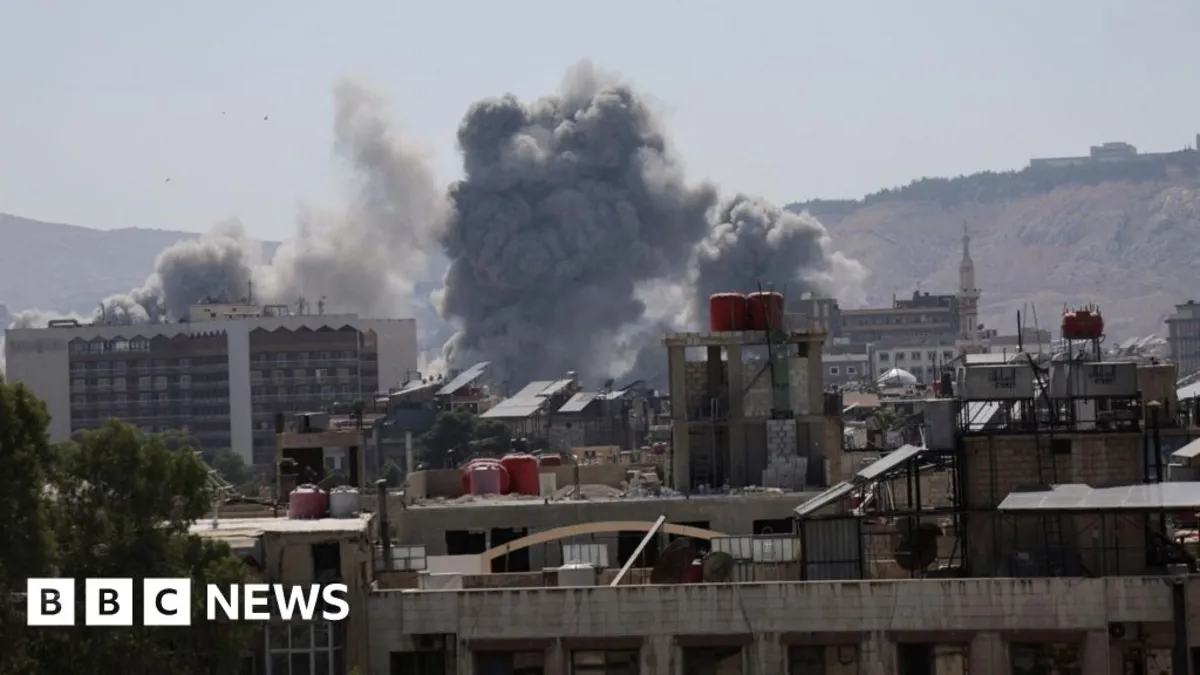
In a significant escalation of violence, Israel's military conducted airstrikes on the Syrian defence ministry in Damascus and targeted government forces in southern Syria on Wednesday. This military action coincided with a violent sectarian conflict in the Druze province of Suweida, which has now entered its fourth day. Reports indicate that over 300 individuals have lost their lives in Suweida since the outbreak of clashes between Druze militias and Bedouin tribes on Sunday.
Prime Minister Benjamin Netanyahu emphasized that the Israeli forces were acting to protect their "Druze brothers" and to dismantle the regime's "gangs." In response, the Syrian foreign ministry condemned Israel's actions, labeling them as "treacherous aggression." The situation has escalated, prompting concerns from international leaders, including US Secretary of State Marco Rubio, who expressed his worry over the violence in southern Syria. Rubio indicated that he believed the conflict would cease within hours, following discussions with US and Arabian officials aimed at achieving a peaceful resolution.
Amidst the chaos, Syria's foreign ministry announced that a ceasefire agreement had been reached with Druze leaders to restore security in Suweida. This agreement stipulated an immediate halt to military operations, the establishment of police checkpoints in Suweida city, and the reintegration of the province into the Syrian state. However, responses from local leaders were mixed; while one Druze leader, Sheikh Yousef Jarbou, confirmed the agreement, another leader, Sheikh Hikmat al-Hajri, urged continued resistance against perceived threats to their autonomy.
The Israeli military's involvement intensified after government forces were deployed to Suweida, marking their first significant presence since the overthrow of President Bashar al-Assad. The Druze community, which practices a distinct offshoot of Shia Islam, remains wary of the interim government led by Ahmed al-Sharaa. Their fears have been exacerbated by recurring sectarian violence, including a previous outbreak in May that resulted in numerous fatalities among Druze and allied Islamist fighters.
Reports from the Syrian Observatory for Human Rights (SOHR) indicate a rapidly deteriorating humanitarian situation in Suweida city, where clashes have led to severe shortages of water and medical supplies. Eyewitness accounts describe scenes of panic as artillery and sniper fire targeted civilians, with local residents struggling to access medical care amidst ongoing violence.
Since the conflict reignited on Sunday, SOHR reports suggest that at least 300 people have died, including 69 Druze fighters and 40 civilians. The violence has claimed the lives of numerous government forces and tribal fighters as well, with casualties from Israeli strikes adding to the toll. The initial spark for this conflict is believed to be the abduction of a Druze merchant, which triggered retaliatory actions and a broader escalation of hostilities.
Israel has consistently maintained a military presence in the region, conducting hundreds of airstrikes to neutralize threats from Syrian military assets since the Assad regime's weakening. Recently, Israeli officials have reiterated their commitment to preventing harm to the Druze, emphasizing their connections to the Druze communities in Israel and the Golan Heights. As the conflict unfolds, Netanyahu and Defence Minister Israel Katz have ordered continued operations against Syrian forces in Suweida, aiming to ensure the safety of the Druze and the demilitarization of the border areas.
The complexities of the situation in Syria, particularly in Suweida, highlight the fragile balance of sectarian tensions and the impact of external military interventions. The ongoing violence not only affects local communities but also poses significant challenges for regional stability.